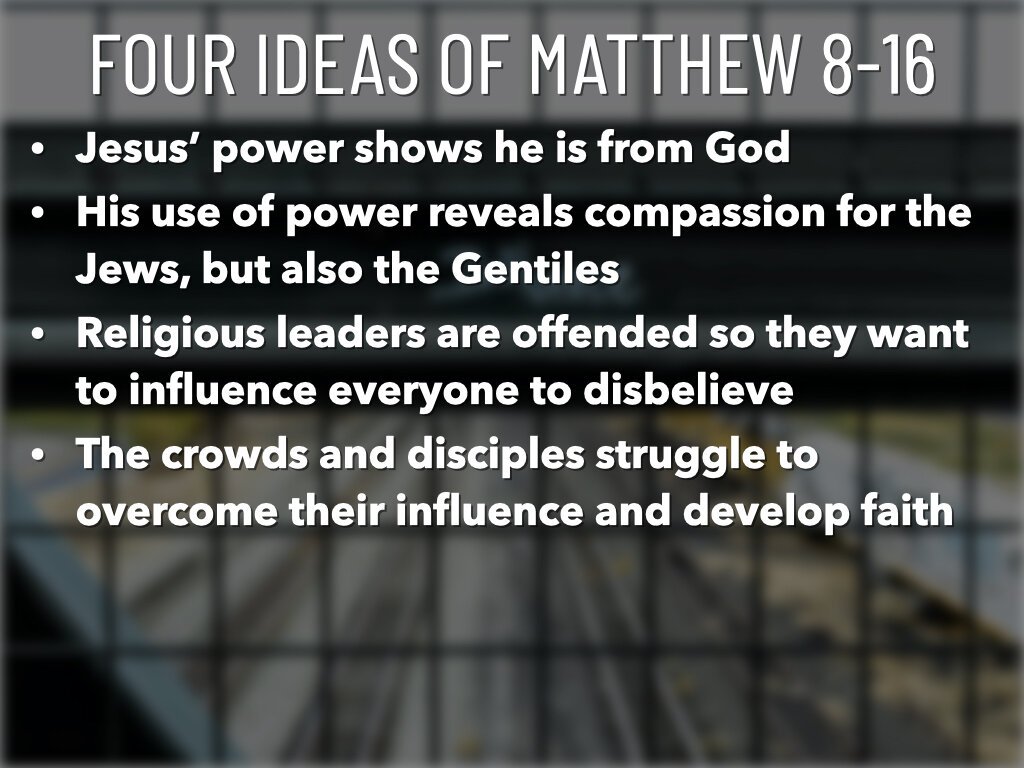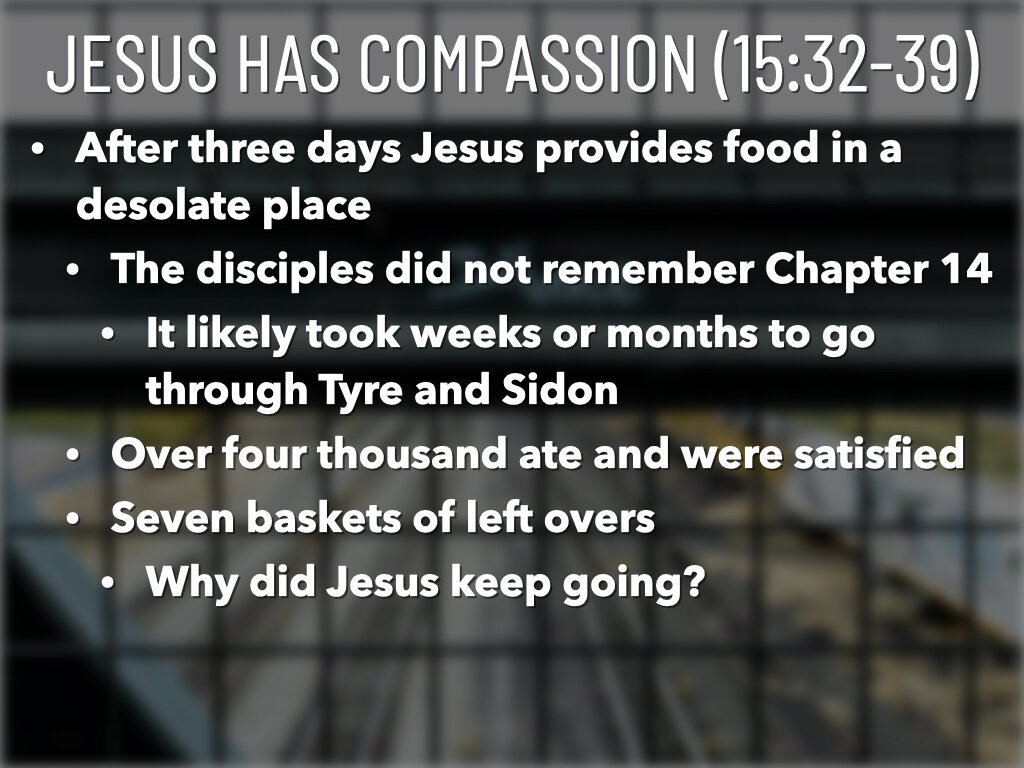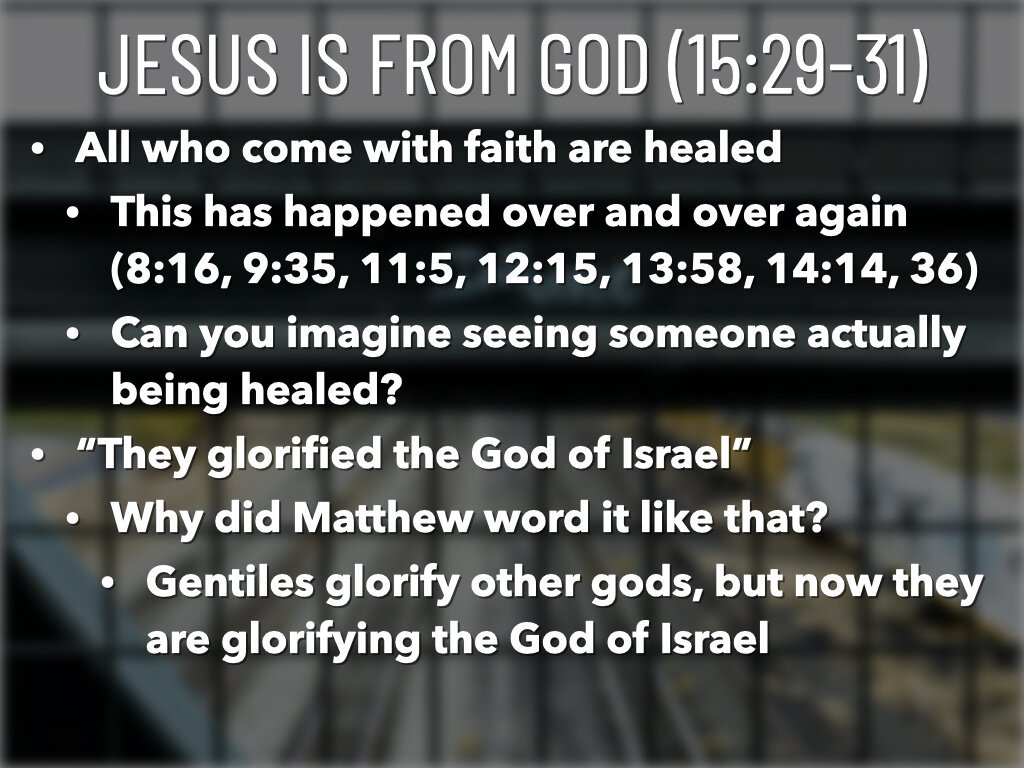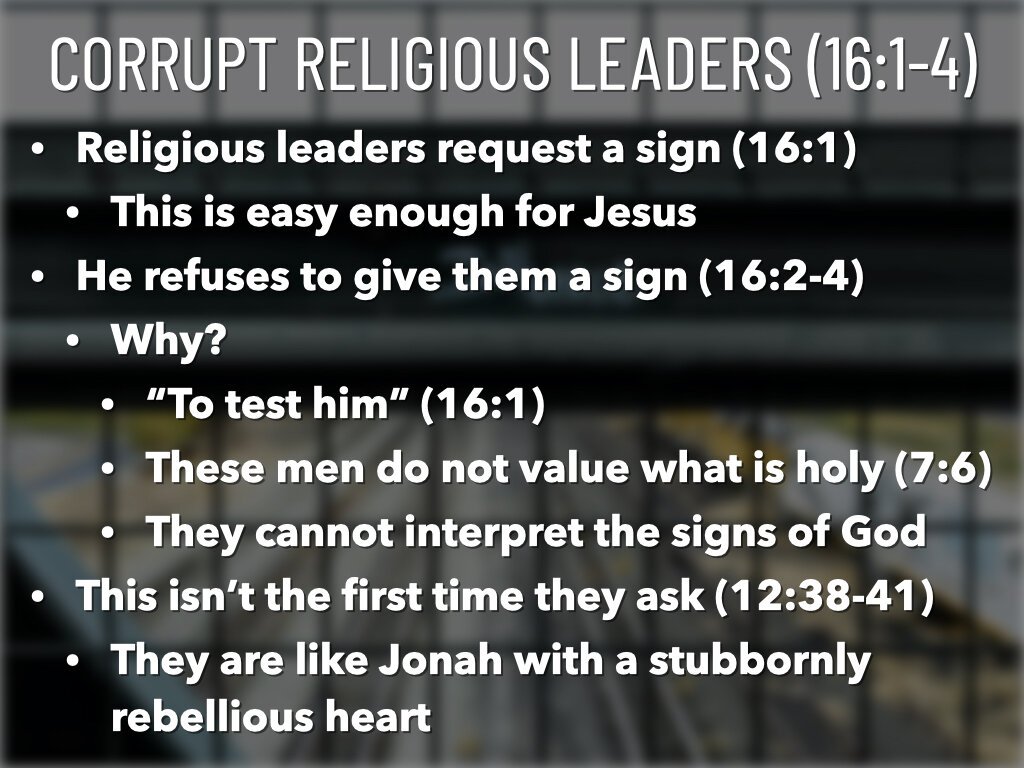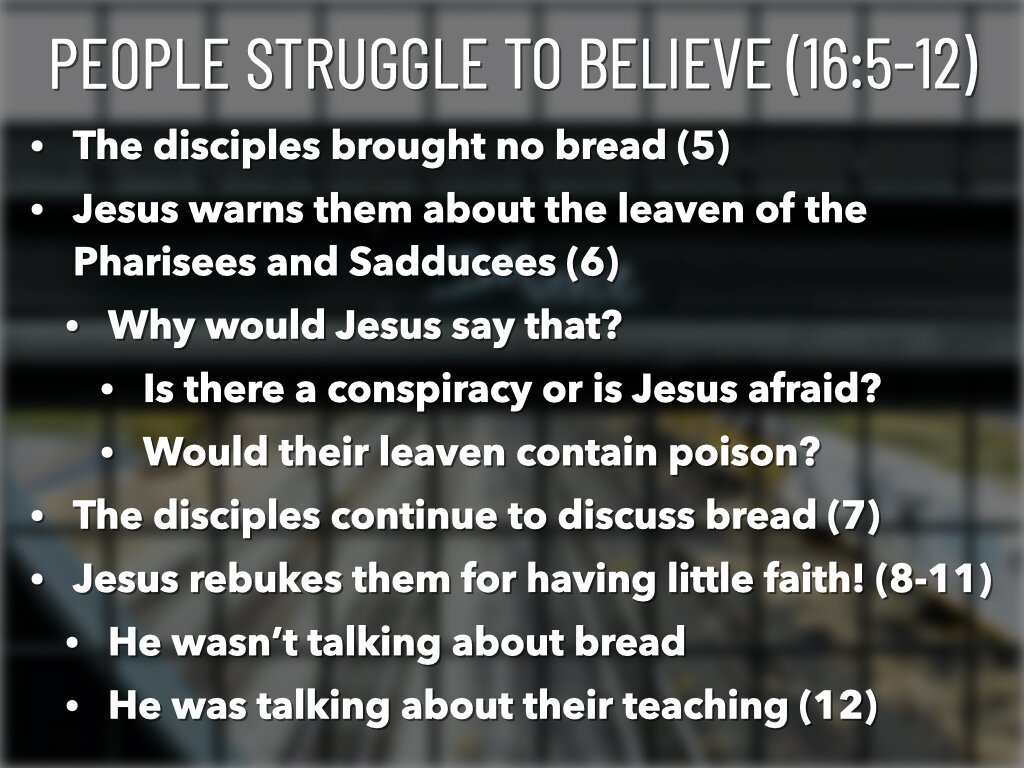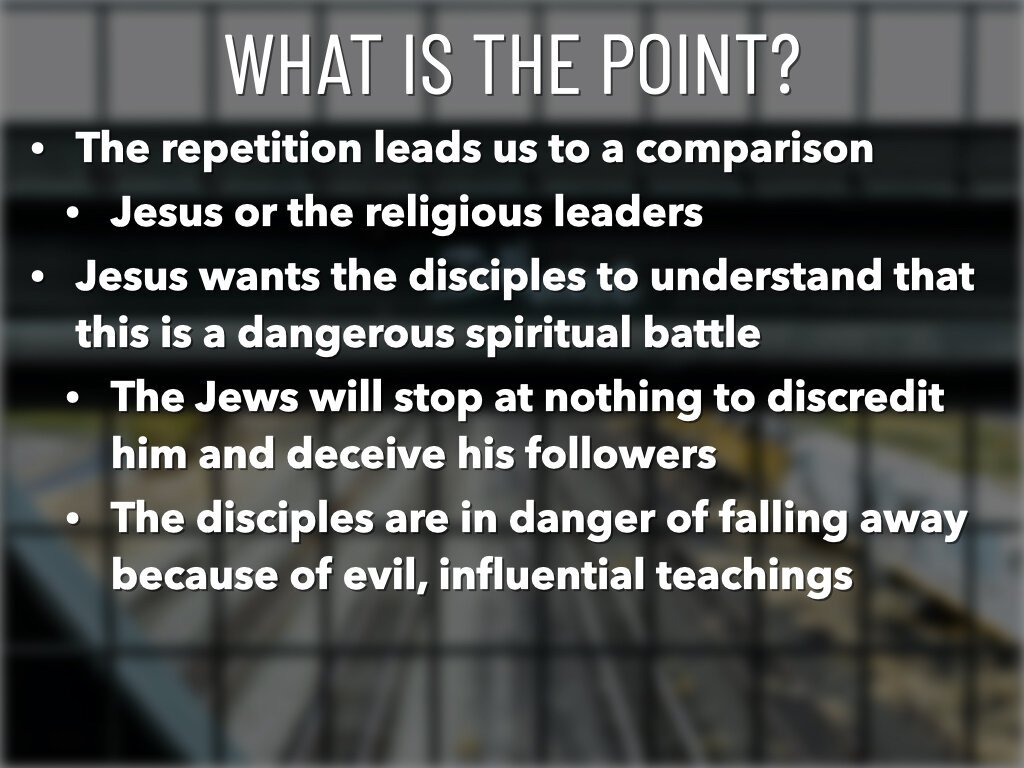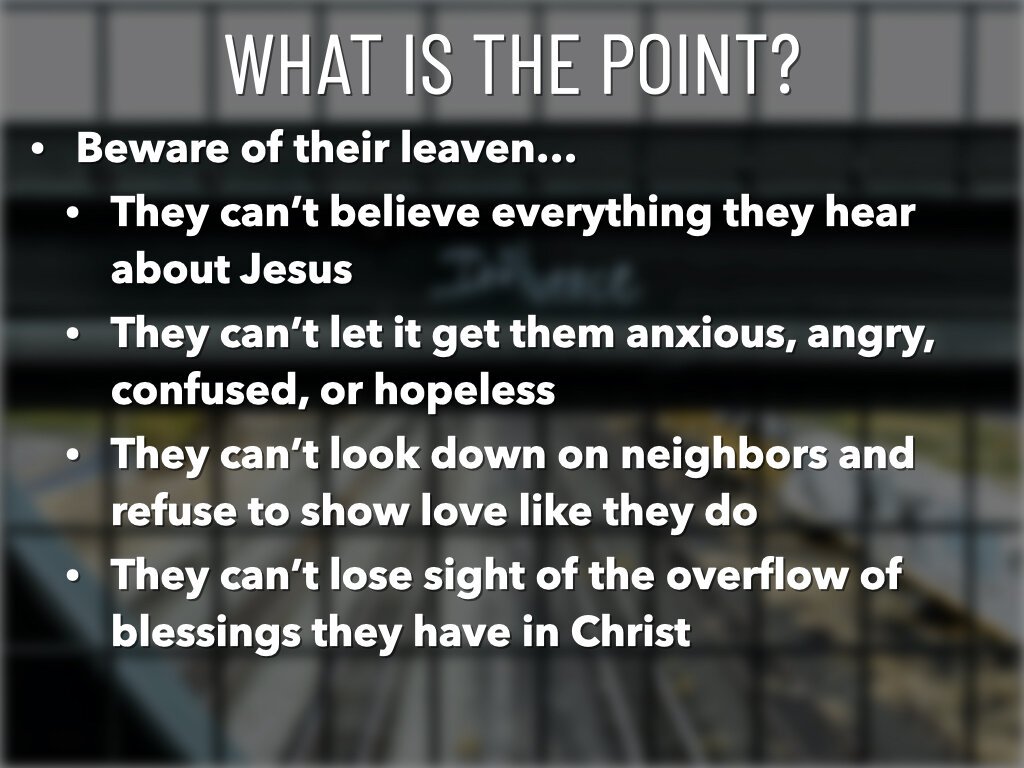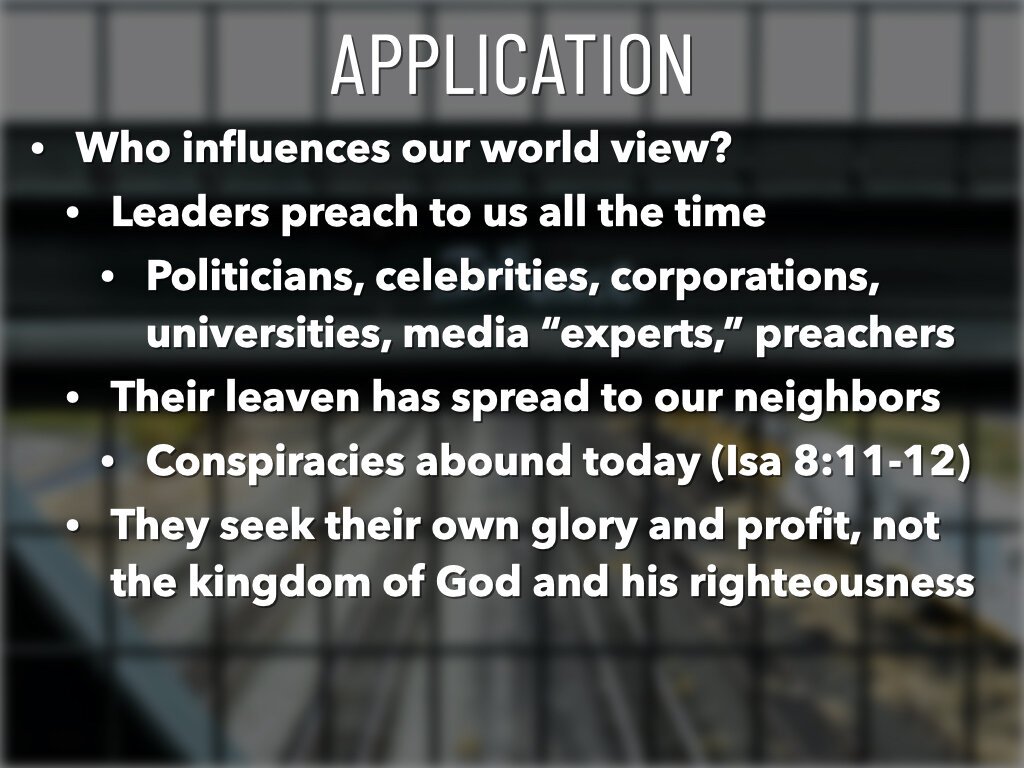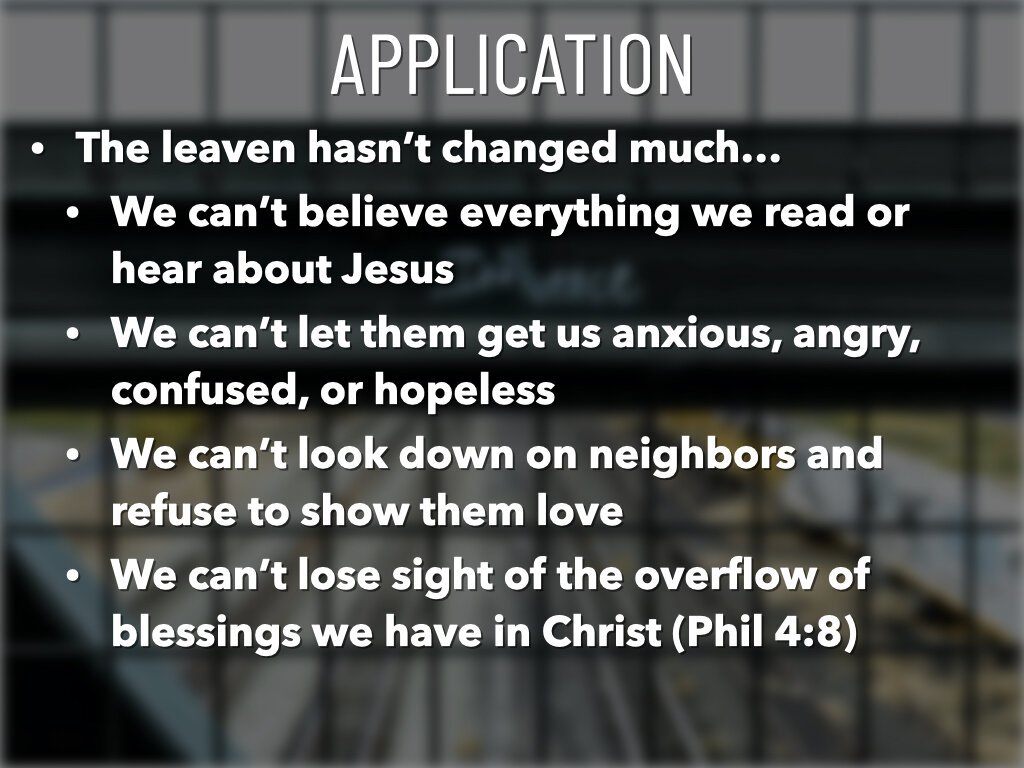Influence (Matthew 15:29-16:12)
Why are we so easy to manipulate? The most influential words in our language are “On Sale.” If we see emails with that in the title, we are intrigued. We click to find out how much on sale they are. One of the things that always gets me is when Amazon says, “Only 5 left in stock.” That makes me want to buy it before they run out. Our markets are extremely advanced in their technique to sell us stuff. They can listen to our conversations and read our internet search history to recommend whatever we were thinking about buying. They have tremendous influence over our buying behavior. What about the spiritual influences around us? This is what I want us to consider as we study Matthew 15 and 16.
Today, we are looking at a section of Matthew that helps us understand all that we have been studying. From Chapter 8 to the text we are studying today, four ideas have been repeated in cycles.
- Jesus has miraculous power that shows he is from God
- He uses those powers to show compassion to the Jews first, but also to the Gentiles
- Religious leaders are offended by him and want to influence the people because they have corrupt hearts
- The crowds and the disciples are struggling to overcome their influence and develop faith in Christ
These four ideas have popped up again and again through Chapters 8-16. The text we will study today includes all of these ideas. So I want us to journey through these four ideas before considering what they all point to and how they help us understand influence.
Jesus Is From God (15:29-31)
Matthew 15:29--31 (ESV) --- 29 Jesus went on from there and walked beside the Sea of Galilee. And he went up on the mountain and sat down there. 30 And great crowds came to him, bringing with them the lame, the blind, the crippled, the mute, and many others, and they put them at his feet, and he healed them, 31 so that the crowd wondered, when they saw the mute speaking, the crippled healthy, the lame walking, and the blind seeing. And they glorified the God of Israel.
First, we see Jesus doing what he has been doing for the last seven chapters, healing people. Everyone who comes to him finds that he can heal them. There is no limit to his power. This power blows everyone away. Can you imagine seeing someone who has been crippled all of your life completely healed? These are not small diseases or infirmities. This is also not a performance like Benny Hinn or the other faith healers. Legitimate health issues are being healed. Notice the response of the people. They are amazed at what he is doing, and they glorify "the God of Israel."
Notice the title "The God of Israel." Why does he say it like that? Why doesn't he just say they glorified God? Remember that there was a mixture of Jews and Gentiles around the Sea of Galilee. That makes sense. In the previous section and earlier in this book Matthew has made it clear that Jesus heals Gentiles as well as Jews. His mission is for the Jews, but he has compassion for Gentiles as well. But this text indicates that they are changing their worship. They did not glorify their gods. They glorified the God of Israel. Jesus was making sure that the Gentiles understood where his power came from. He is shining a light for the Gentiles.
Jesus Has Compassion (15:32-39)
Matthew 15:32--39 (ESV) --- 32 Then Jesus called his disciples to him and said, “I have compassion on the crowd because they have been with me now three days and have nothing to eat. And I am unwilling to send them away hungry, lest they faint on the way.” 33 And the disciples said to him, “Where are we to get enough bread in such a desolate place to feed so great a crowd?” 34 And Jesus said to them, “How many loaves do you have?” They said, “Seven, and a few small fish.” 35 And directing the crowd to sit down on the ground, 36 he took the seven loaves and the fish, and having given thanks he broke them and gave them to the disciples, and the disciples gave them to the crowds. 37 And they all ate and were satisfied. And they took up seven baskets full of the broken pieces left over. 38 Those who ate were four thousand men, besides women and children. 39 And after sending away the crowds, he got into the boat and went to the region of Magadan.
After three days had passed, these people were still there wanting to be around Jesus. Can you imagine Jesus teaching people for three days? Eventually, everyone would run out of food, but that's okay because Jesus can multiply what they have. This should remind us of the last chapter, where he did the exact same thing. Jesus has compassion and provides nourishment to hungry people in a desolate place.
Two interesting things take place here. First, The disciples did not remember the first time Jesus fed a multitude. Maybe some weeks or months had passed. His trip to Tyre and Sidon probably took multiple weeks of travel, not counting his time spent teaching. Regardless, it did not come into their minds that he could multiply the bread they had. They asked, "Where are we to get enough bread in such a desolate place to feed so great a crowd." Who could forget that miracle?
Second, notice that the text says that they ate and were satisfied. He started with only seven loaves and a few small fish. Somehow that fed over four thousand people. Seven loaves and a few small fish would not be enough to feed the people in this building, but Jesus multiplied them to feed thousands of people. Then seven baskets were full of leftovers. Jesus doesn't just provide enough to fill everyone's stomach. He provides an abundance. I imagine he knew how much would be enough, but he kept going so that seven baskets were full. Jesus has more than enough power to provide for everyone who comes to him.
Then Jesus sends them away and travels to Magadan. We don't know where Magadan is but look at what happens in Magadan.
Religious Leaders Are Corrupt (16:1-4)
Matthew 16:1 (ESV) --- 1 And the Pharisees and Sadducees came, and to test him they asked him to show them a sign from heaven.
The religious leaders come up wanting to see a sign from heaven. It just so happens that Jesus can whip up a miracle anytime he wants to. So we would expect him to heal someone, walk on water, change the weather, or multiply food. Jesus has just healed people for three days and fed over four thousand people. This shouldn't be a problem for him. But look at what he says.
Matthew 16:2--4 (ESV) --- 2 He answered them, “When it is evening, you say, ‘It will be fair weather, for the sky is red.’ 3 And in the morning, ‘It will be stormy today, for the sky is red and threatening.’ You know how to interpret the appearance of the sky, but you cannot interpret the signs of the times. 4 An evil and adulterous generation seeks for a sign, but no sign will be given to it except the sign of Jonah.” So he left them and departed.
Jesus refuses to give them a sign. Isn't that strange? Why wouldn't he give them a sign? The answer lies in the way Matthew introduces their request. He says, "to test him they asked him to show them a sign." These men had no faith in Jesus. What Jesus said back in Matthew 7 is true of them.
Matthew 7:6 (ESV) --- 6 “Do not give dogs what is holy, and do not throw your pearls before pigs, lest they trample them underfoot and turn to attack you.
These men are dogs who do not value what is holy. They are pigs who would trample on the pearl given to them and turn to attack Jesus. If they really wanted to see a sign, they had ample opportunity to see for themselves. They did not want to see a sign. They wanted to debunk Jesus, and they would do everything in their power to bring him down. They refuse to believe.
Jesus says that they can interpret the weather without any issues. They can tell when a storm is coming because the sky changes. But they cannot see that the kingdom of heaven is at hand. John the Baptist was a prophet proclaiming this truth. Jesus is doing mighty works by God's power and teaching truths that go beyond any religious teacher, but they refuse to believe.
Then, Jesus says that "an evil and adulterous generations seeks for a sign, but no sign will be given to it except the sign of Jonah." This is the same response he gave in Chapter 12.
Matthew 12:38--41 (ESV) --- 38 Then some of the scribes and Pharisees answered him, saying, “Teacher, we wish to see a sign from you.” 39 But he answered them, “An evil and adulterous generation seeks for a sign, but no sign will be given to it except the sign of the prophet Jonah. 40 For just as Jonah was three days and three nights in the belly of the great fish, so will the Son of Man be three days and three nights in the heart of the earth. 41 The men of Nineveh will rise up at the judgment with this generation and condemn it, for they repented at the preaching of Jonah, and behold, something greater than Jonah is here.
They ask for a sign because they are like Jonah, the stubborn and rebellious prophet. They have their minds set on how God is supposed to be, and they refuse to accept the notion that God could be different. This is the picture of a stubborn heart that lives inside a person who will not be persuaded. It does not matter how much evidence is placed before them. They will always find a way to discredit the truth because their hearts want to believe something other than God's will. Jesus will not give them any ammo. He leaves them alone. But look with me in the last section.
People Struggle To Believe (16:5-12)
Matthew 16:5--12 (ESV) --- 5 When the disciples reached the other side, they had forgotten to bring any bread. 6 Jesus said to them, “Watch and beware of the leaven of the Pharisees and Sadducees.” 7 And they began discussing it among themselves, saying, “We brought no bread.” 8 But Jesus, aware of this, said, “O you of little faith, why are you discussing among yourselves the fact that you have no bread? 9 Do you not yet perceive? Do you not remember the five loaves for the five thousand, and how many baskets you gathered? 10 Or the seven loaves for the four thousand, and how many baskets you gathered? 11 How is it that you fail to understand that I did not speak about bread? Beware of the leaven of the Pharisees and Sadducees.” 12 Then they understood that he did not tell them to beware of the leaven of bread, but of the teaching of the Pharisees and Sadducees.
In the final section, we see that the disciples have left Magadan in their boat and traveled to the other side of the Sea of Galilee. When they get there, they realize that they have no bread. So Jesus tells them, "Watch and beware of the leaven of the Pharisees and Sadducees." That's odd. Does Jesus want his disciples to avoid buying bread from religious leaders? Is Jesus afraid? Does he have some conspiracy that these guys are going to poison them?
Notice that the disciples keep talking about bread, and Jesus gets aggravated with them. It turns out that going without bread is not a huge deal. They should remember the times he turned a little bit of bread into plenty. Jesus can take care of them. They could just go to Jesus and ask him to turn stones into bread. But notice that they don't do that. It almost seems like they don't even realize that as a possibility. In fact, Jesus says that their concern about bread proves how little their faith is.
He says that he wasn't talking to them about the bread of the Pharisees and Sadducees. Then he repeats, "Beware of the leaven of the Pharisees and Sadducees." Leaven is the yeast or bacteria that causes bread to expand and rise. It is spreads and eventually changes the consistency of the dough. When Jesus says, "Beware of the leaven of these religious leaders," for the second time, they understood that he was talking about the teachings of these men.
They had just tried to test Jesus to deceive people and make them doubt that Jesus is the Messiah. Jesus is aware of their tricks, and the disciples must be as well.
What's The Point?
We have covered a lot in nearly eight chapters of Matthew. But these final four sections encapsulate the core message of eight chapters. The first three parts (Healing, Feeding, and Refusing to give a sign) are the same information we have seen before with minor differences. But the final section helps us understand why Matthew provided this information.
Spiritual Battle
Matthew wants us to see that Jesus is in a spiritual battle against the Jewish authorities of his day to win the hearts of the people. This is much like our election. The Jews don't want to lose their power, and they will stop at nothing to slander Jesus' name and keep Jesus from being the Messiah (which he already is). But notice that Jesus does nothing to slander them. He simply refuses to fall for their tricks.
We need to see the contrast between Jesus and the Pharisees throughout this section. Jesus' mission is to help people and teaching them about the kingdom of heaven. There is no corruption like we see in our politics. The Pharisees are all about discrediting Jesus. Matthew shows us how Jesus was a man who did nothing but good and received evil. Those who should have believed in him and accepted him didn't. They refused to submit because they were either concerned about their glory and status in the Jewish community or manipulated to believe a lie. But the Gentiles received him gladly. Jesus' crowds are transitioning from Jew to Gentile because of the Jewish teachers.
Disciple Training
In this text, we see Jesus warning his disciples of the leaven of the Pharisees and Sadducees. They have hurt the mission of Christ. This points us to an even bigger idea: disciples must beware of false influencers.
In Jewish society, men had risen to the top who could persuade people to believe whatever they want. Consider how Jesus has been developing his disciples to overcome that. He wants them to understand who he is so that they put their faith in him. This is not a small task. The disciples are continually pulled by the religious leaders to believe that Jesus is deceiving them. These crooked people are always trying to instill doubt and fear. They say that Jesus is doing all of these works by the power of Satan. They ask for a better sign. They ask why he is changing the traditions. Remember that the disciples have given up everything to follow Jesus. When you go out on a limb, the wind and rain make you scared of falling. The religious leaders are testing their trust. But Jesus builds them up and strengthens them. He repeatedly helps them see that he is the Messiah because they need to be reminded. Jesus knows that more extreme tests will come.
Application
How does this help us? Do we have any stubborn religious leaders today? I'm sure you can find them in every town and on every device across our world. Many people refuse to listen to the truth in God's word, and they try to convince us to doubt him. Aren't politicians, celebrities, corporations, universities, and the news all stubbornly rejecting the truth. Do we see their leaven?
Isaiah 8:11--12 (ESV) --- 11 For the Lord spoke thus to me with his strong hand upon me, and warned me not to walk in the way of this people, saying: 12 “Do not call conspiracy all that this people calls conspiracy, and do not fear what they fear, nor be in dread.
We need to be trained to overcome false influence. It may be that we have some amount of leaven inside of our minds, and we need to remove it. This goes both ways. This section re-enforces the truth that Jesus is the Messiah, who came to show tremendous compassion and demonstrate God's power. But it also indicates that he rejects the stubbornly rebellious. Is there anything in our theology that paints a different picture of Jesus? If so, we must remove it!
Jesus came to save the world and provide the satisfaction that we need. But he will not accept those who reject him. We must take his truth and reject the false narratives that we hear all the time. Following them will leave us empty. They have massive influence as they manipulate us for their own glory and profit. Beware of their influence, and don't be afraid to offend them or hold back.
Back in Chapter 15, Jesus blatantly offended the Pharisees, and the disciples were worried about it. In this section, Jesus refuses to give them a sign because they are testing him. The disciples probably wish that he had given them a sign. They want these religious leaders to join them, but Jesus is not interested in half-hearted followers. Matthew's readers needed to hear this, and so do we. Our society and religious leaders pressure us to believe what is popular and accept half-hearted faithfulness. Thanks to technology, they have more power at their disposal than ever before. We need to be aware of their tactics of manipulation and avoid falling into their traps.
Don't believe what you read on Facebook or hear on the news. Don't let it get you angry, confused, or hopeless. Don't lose sight of the overflow of blessings we have been given in Christ. I have heard of and seen so many people who let Satan's manipulation fill them with anxiety and fear. People don't even know how to act around other people. So many people believe that everyone else is incompetent. Do we see how proud that is? We must believe that Jesus can redeem the most godless in our society, and that means he can even save me. It's not my crazy Facebook friend or neighbor that needs the most forgiveness. It's me. This heart and way of thinking must overcome the dominant attitude in our society.


